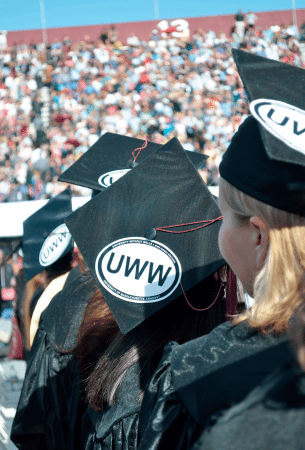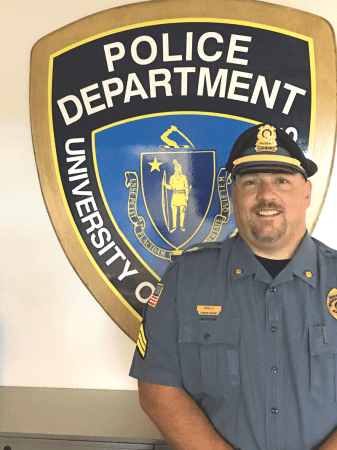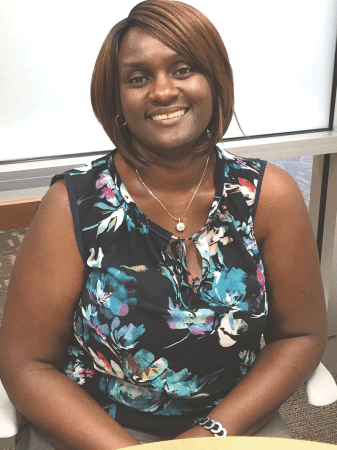
UWW Provides New Opportunities to Non-traditional Students
If at First You Don’t Succeed ….
By Kathleen Mellen
 Those managing the University Without Walls program at UMass Amherst are big believers in the phrase ‘giving credit where it’s due.’ Indeed, UWW awards college credits for experience garnered in the workplace, enabling non-traditional students to gain the degrees needed to advance their careers.
Those managing the University Without Walls program at UMass Amherst are big believers in the phrase ‘giving credit where it’s due.’ Indeed, UWW awards college credits for experience garnered in the workplace, enabling non-traditional students to gain the degrees needed to advance their careers.
By his own account, Matthew Malo wasn’t much of a high-school student. But when he graduated in 1992 from Hampshire Regional High School, he set off for college anyway.
Big mistake.
Malo, 43, who is now a sergeant in the police department at UMass Amherst, said he matriculated at the Stockbridge School at UMass back then, thinking he would study landscaping. But, once there, he floundered.
“It wasn’t what I thought it would be. It was a lot of designing and art, and I’m not an artist or a designer,” said the Southampton resident in a recent interview at the UMass police station. “I wanted to be the guy who was out there doing it — not in a classroom.”
He left the program after just one semester.
The next year, at the urging of his parents, he tried college again — this time enrolling at Holyoke Community College. That didn’t go any better.
“It was like high school, one year later,” he said. “A lot of my friends were there, and if I had a class I didn’t like, and a bunch of my friends were hanging out in the cafeteria, guess where I was?”
Strike two. But, as the saying goes, third time’s the charm.

Matthew Malo says he’s “kicking butt” in UWW after two unsuccessful attempts at a more traditional college experience.
In 2006, Malo’s father suggested his son look into UMass Amherst’s University Without Walls, a bachelor’s-degree-completion program for non-traditional students, many of whom, like Malo, have abandoned earlier efforts at college. By that time, Malo had been working for some time as a UMass police officer, had gone through the Western Massachusetts Regional Municipal Police Academy, and had even successfully completed a few courses in criminal justice at Greenfield Community College.
“I finally found something I liked,” Malo said.
So, he decided to give it the old college try — one more time. Today, Malo is a student at UWW, where’s he’s studying criminal justice — and, as he puts it, “kicking butt.” He expects to graduate in spring 2019.
UWW, established in 1971, is one of the oldest adult bachelor’s-degree-completion programs in the country. Its specialized services include flexibility in scheduling, options to accelerate the degree process, and the opportunity to receive college credit for work or life experience, including service in the military.
“We believe learning doesn’t have to take place in the classroom, so we take into account the experience they have — the training and learning they’ve had through a variety of experiences,” said UWW’s director, Ingrid Bracey. “We meet students where they are, and the students are amazed at the amount of learning they actually have. The best part of being at UWW is seeing that light go on.”
Degrees of Progress
In winter 2016, Malo met with an advisor at UWW, who explained that the program would allow him to design a major based on his personal interests, and could offer up to 75 transfer credits from previous college courses, no matter how long ago they were taken.
He also discovered that, upon the completion of an in-depth, written portfolio that explored his experiential learning, he would be eligible to receive up to 30 college credits for the work, and living, he’d already done.
Perhaps most important, he said, was that course delivery through UWW is available fully online. (Traditional classes are also available, as are classes that blend online and classroom learning.) That, he said, has been crucial to his success in the program.
“My biggest concern about going back to college was scheduling,” said Malo, who has two school-aged children and works part-time for a small-town police department, in addition to his full-time duties as a UMass cop. “When the adviser said I could do all my classwork online, on my own time, I thought, ‘they really get it. They understand what’s going on with people like me.’”
He’s not alone: online classes are a rising trend across the country. According to a 2014 report from the Babson Survey Research Group, 33% of college students in the U.S. are enrolled in at least one online course, and the rate of online course enrollment continues to far exceed the overall rate of college enrollment.
Judith Odindo’s path to UWW could not have been more different from Malo’s.
SEE: List of Colleges
A native of Kenya, Odindo, 38, had come to the U.S. in 2001 to study as an international student at Montclair State University in New Jersey. She already had some college under her belt in Kenya, and was looking forward to her year of study abroad.
But then her mother, who was paying her tuition, fell ill back home, and Odindo’s financial support evaporated. So, after a single semester, she was forced to drop out. And because her family was struggling to make ends meet, she knew it would be a burden to them if she returned home.
That left Odindo stranded in a foreign country, on a student’s visa, but with no way to continue her schooling. She was heartbroken.
Nevertheless, she decided to stick it out in the U.S., which required changing her visa status to allow her to work — not an easy process, she said. Through a series of circumstances, and a move from New Jersey to Springfield, Odindo was able to find work with the Mass. Department of Developmental Services, but it was always her intention to return to college — someday, somehow.
Eventually, she began to take classes as a part-time student at Springfield Technical Community College, but, because of her schedule as a supervisor in a residential home in Springfield, it was a slow process, with no discernable end in sight.
Then, one day, she came across a flyer about UWW. She sent an e-mail inquiry to the program and described her predicament. The response was quick, and hopeful.

Judith Odindo says UWW fit her life and work responsibilities in a way other programs did not, allowing her to earn an elusive degree.
“They told me I would be a perfect fit for the program,” Odindo said in an interview at the UMass Center in Tower Square in Springfield. She learned she could transfer her credits from Montclair and STCC, and would likely receive additional credits for her work and life experience. “I said, ‘wow. It fits my life and my work schedule. This could be a way for me to finish my degree.’”
So she signed on, and two years later, in May, she received a bachelor’s degree, with a focus in business studies. Fortunately, her mother has since recovered, and now lives in Springfield as well.
“From a tough time, great things happened,” Odindo said.
Courses of Action
UWW is an academic major at UMass, with 12 full-time faculty and nine full-time administrative staff members, all with expertise in teaching and advising adult students. Students take core UWW departmental courses and then build their degree concentrations by taking courses throughout the university.
More than 4,000 adults have received bachelor’s degrees from the program since it’s inception more than 45 years ago, including NBA legend Julius Erving (Dr. J) and Monster.com founder Jeff Taylor. It enrolls about 1,000 to 1,200 students per semester and enjoys a 65% to 75% graduation rate, significantly higher than the rate of 35% to 40% seen in most degree-completion programs, Bracey said. And a significant number go on to receive higher degrees.
“The number-one thing they want is for you to succeed,” Odindo said.
Elizabeth Brinkerhoff knows from experience just how life-altering a degree from UWW can be. Brinkerhoff, 66, who lives in Shutesbury, is a 1981 graduate of the program, and also worked for many years as a faculty member and advisor in the program, retiring two years ago. She credits her time as a student there with providing the boost she needed to build a career.
Brinkerhoff says she followed four years as “half-assed high-school student” with a “lackadaisical stint” at GCC. “I was floundering,” she said. “I really had no idea what I wanted to do.”
So she dropped out, joined the workforce, moved around a bit, and finally landed back in Western Mass., where she found a job working with alternative-education programs for grades K-12. Then, in 1978, a friend encouraged her to look into the UWW.
Brinkerhoff’s employer at the time supported the idea and allowed her to adjust her work schedule to accommodate classes. (Unlike today’s students, who overwhelmingly choose to take online classes, students in Brinkerhoff’s day had to report to brick-and-mortar classrooms.) She enrolled in spring 1978, and went on to receive a master’s degree from Suffolk University in Boston and, later, a doctorate from the UMass School of Education.
She had planned to become a high-school guidance counselor, but once she started classes at UWW, it didn’t take long for her to adjust her career goals.
“I realized there were a whole lot of people, like me, who were coming back to school, so I stayed in higher education, and with adult learners,” she said.
It’s a trend that has continued: with the demand for college-educated employees steadily increasing, the Executive Office of Labor and Workforce Development has projected that 60% of workers in Massachusetts, and 40% nationally, will need to have an associate’s degree or higher to be competitive in the job market. And that’s sending older Americans back to college.
Today, three-quarters of U.S. undergraduate students are now considered ‘non-traditional,’ according to the National Center for Education Statistics, which has estimated that enrollment of 25- to 34-year-olds in undergraduate degree programs will increase 28% by 2019, while enrollment of students over 35 will go up 22%. That means that adult-learning, post-secondary models, like UWW, are likely to play an increasingly important role in preparing students for today’s workforce.
Indeed, thanks to her UWW education, Odindo says, she’s now eligible to apply for certain advancements in her workplace, and also plans to attend law school. And the UWW experience certainly set Brinkerhoff on her way to a long and successful career.
“The faculty and the students at University Without Walls are part of a learning culture — that thing that happens when people’s minds are at work. It taught me how to learn and how to think, and it helped define my career,” she said. “Then, knowing the program as well as I did, I could help students understand just what was possible there.”
Grade Expectations
As for Malo, he says he hopes his bachelor’s degree will make him “a little more marketable” for advancement on the police force, but that’s not why he’s attending UWW.
“It’s always bugged me that I never finished — there’s always been that weight on my shoulders,” he said. Plus, he added, he’s doing it for his children — Jonathan, 14, and Savanna, 10. “I want my kids to see me finish my degree. They’ll know if I can do it, they can do it, too.”
Thanks to UWW, a lot more people have been able to ‘do it.’




